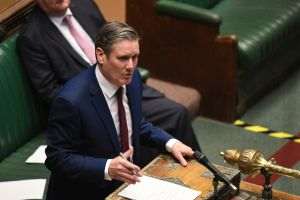• October 4
- The Ministry of Finance launches the first issue of Samurai bonds totaling 33 billion yen, with firm purchase orders from investors amounting to 34.1 billion yen.
• October 7
- The financial rating agency Standard&Poor's (S&P) decides to maintain the rating of Romania's government debt at BBB-/A3, with a stable outlook, for long-term and short-term foreign currency debt.
- The Government approves measures regarding the level of safety in the functioning of the national energy system.
• October 11
- The mandate of the new Board of Directors of the National Bank of Romania enters into force, for a period of five years.
• October 16
- The Government approves the establishment of Carpatica Feroviar SA, a strategic company for rail transport.
- The Government approves the financing of the training of Ukrainian pilots who will operate F-16 fighter jets.
• October 24
- The Fiscal Adjustment Plan is published to bring the budget deficit back within the maximum target of 3% of GDP established by European regulations.
• November 8
- The Board of Directors of the National Bank of Romania decides the following: to maintain the monetary policy interest rate at 6.50%.
• November 14
- The Government supplements the budget of the Ministry of Health with 1.4 billion lei - budgetary credits, for the full payment, in December 2024, of medical materials and services.
• November 21
- The Government approves the Industrial Strategy for the period 2024-2030, which provides for increasing the competitiveness of the industrial sector by adopting advanced technologies, promoting innovation and the transition to the circular economy, supporting industrial exports and the resilience of supply chains, as well as developing a skilled workforce and attracting investments in sectors with high added value.
- The Executive approves the Energy Strategy for the period 2025-2035, which aims to develop a sustainable, competitive and secure energy sector, aligned with the EU's climate objectives.
• November 24
- The first round of the presidential elections takes place, placing the independent Călin Georgescu and the USR president, Elena Lasconi, in the first two places.
- Bucharest voters approve with over 66% of the votes the three administrative aspects proposed by referendum by Mayor General Nicuşor Dan: the distribution of financial resources between the City Hall and the Government, the granting of construction permits and the prevention of drug use in schools.
• November 27
- The Government approves the increase in the gross minimum wage in the country, which will increase from 3,700 lei to 4,050 lei from January 1, 2025. This measure is expected to benefit over 1.8 million employees.
- The Executive adopts a government decision on the approval of the National Strategy for the Defense Industry 2024-2030, which provides for the development of a resilient industrial ecosystem for the defense industry, emphasizing modernization and international cooperation.
- The Government approves the National Market Surveillance Strategy 2024-2027, which aims at the conformity of products sold on the market, consumer protection and the elimination of non-compliant practices. Through it, a National Contact Point for the RAPEX rapid alert system will be created, measures will be implemented to streamline controls throughout the distribution chain, which will lead to a reduction in the number of non-compliant products on the market in our country.
• November 28
- The Supreme Council for National Defense (CSAT) meets and finds that there have been cyber attacks aimed at influencing the fairness of the November 24 electoral process.
• December 1
- Parliamentary elections are held, and following the vote cast by over 9.4 million citizens, the following structure of the Legislature results: PSD - 122 mandates, AUR - 91, PNL - 71, USR - 59, SOS Romania - 40, UDMR - 32, POT - 31, National Minorities Group - 19.
- The NBR announces that, on November 30, 2024, the foreign exchange reserves at the National Bank of Romania stood at 61,174 million euros, compared to 62,841 million euros on October 31, 2024. The level of the gold reserve remained at 103.6 tons. Given the evolution of international prices, its value stood at 8,399 million euros. Romania's international reserves (currency plus gold) as of November 30, 2024 were 69,573 million euros, compared to 71,361 million euros as of October 31, 2024.
• December 2
- The Constitutional Court of Romania (CCR) validates the first round of the presidential elections, held on November 24, which placed Elena Lasconi (USR) and Călin Georgescu (independent) in the first two places.
• December 6
- The Constitutional Court decides to annul the first round of the presidential elections. President Klaus Iohannis announces that he will remain in office until a new president of the country is elected.
• December 13
- The National Bank of Romania announces that, in the period January-October 2024, the current account of the balance of payments recorded a deficit of 24,210 million euros, compared to 18,453 million euros in the period January-October 2023. In its structure, the balance of goods recorded a deficit higher by 3,706 million euros, the balance of services - a surplus lower by 1,690 million euros, the balance of primary income - a deficit higher by 793 million euros, and the balance of secondary income - a surplus higher by 432 million euros.
• December 17
- The financial rating agency Fitch Ratings revises the outlook for Romania's rating from "stable" to "negative", but confirmed our country's long-term foreign currency rating at "BBB-".
• December 20
- The new Parliament is formed, and Klaus Iohannis appoints Marcel Ciolacu as Prime Minister in charge of forming the new government.
• December 23
- The Ciolacu 2nd Government passes the Parliament's vote and takes the oath of office. The composition of the new Government is as follows: Marcel Ciolacu - Prime Minister; Radu Marinescu - Minister of Justice; Sorin Grindeanu - Minister of Transport; Alexandru Rafila - Minister of Health; Angel Tîlvăr - Minister of Defense; Natalia Intotero - Minister of Culture; Florin Barbu - Minister of Agriculture; Simona Bucura Oprescu - Minister of Labor and Family; Bogdan Ivan - Minister of Economy and Digitalization; Cătălin Predoiu - Minister of Internal Affairs; Sebastian Burduja - Minister of Energy; Emil Hurezeanu - Minister of Foreign Affairs; Daniel David - Minister of Education; Marcel Boloş - Minister of European Funds; Mircea Fechet - Minister of the Environment; Tanczos Barna - Minister of Finance; Cseke Attila - Minister of Development.
• December 30
- The Government adopts the "Little Train" ordinance, which introduces a set of measures aimed at reducing the budget deficit, supporting public investment and optimizing the functioning of the state by reducing excessive spending.
• December 31
- The Ministry of Finance announces that, in the first 11 months of 2024, the budget deficit was 125.72 billion lei (7.12% of GDP), compared to 73.55 billion lei (4.58% of GDP) in the period January - November 2023.
- The BET index, of the 20 most liquid stocks on the Bucharest Stock Exchange (BVB), decreased by 5.1% in the last quarter of 2024, to 16,721 points, while the BET-BK index, the benchmark for the performance of equity investment funds, depreciated by almost 5%, to 3,139 points.
- The BET-XT index, of the 30 most liquid stocks on our market, decreased by 4.8%, to 1,445 points.
- The shares of the Danube freight carrier Transport Trade Services depreciated by 30.3% between October and December 2024, the largest decline in the main basket of shares on our market.
- The BET-FI index, of former SIFs plus Fondul Proprietatea, was the only BVB basket of shares that ended the last quarter of last year in positive territory, with a slight appreciation of 0.17%.

























































